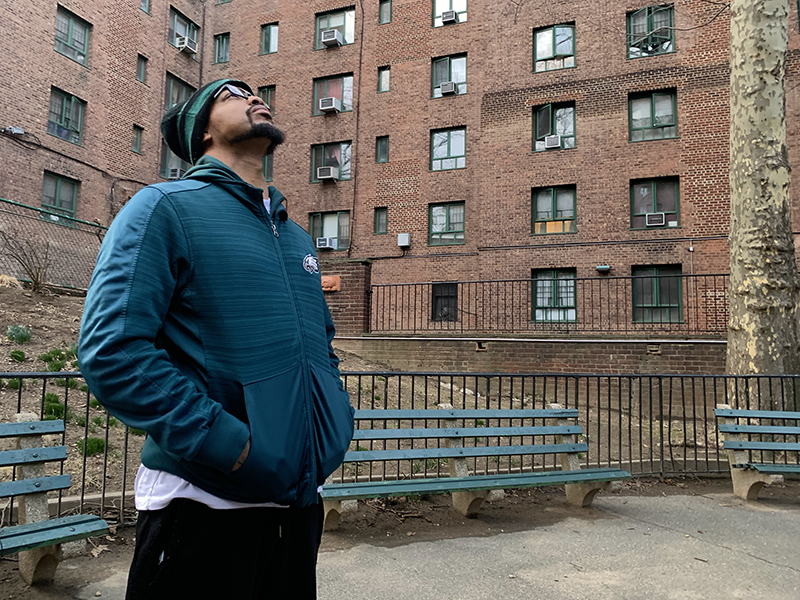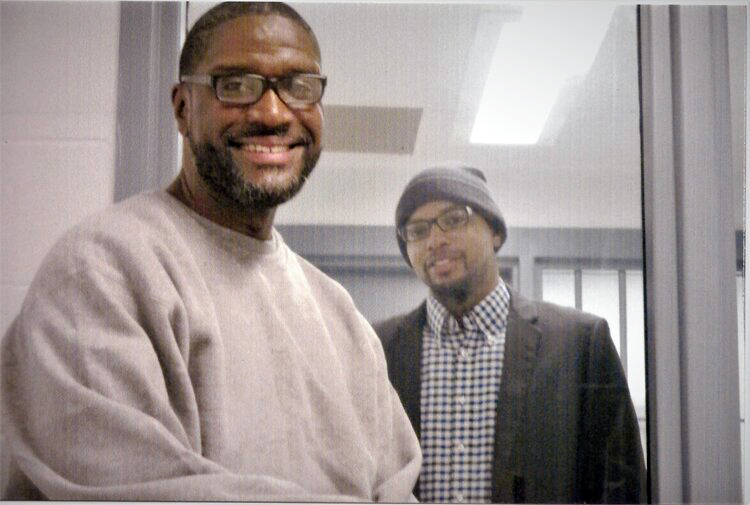
Pastor Aaron Chancy, 40, in Bronx, New York, on March 2, 2023. Chancy spent a total of two years in prison on felonies, and other periods in and out of jail on misdemeanors. In 2008, Chancy decided to change, devoting his life to religion and helping others “to realize their potential,” he says. Photo by Eleonora Francica
ALBANY, N.Y. (RNS) — “I didn’t grow up wanting to be a pastor,” says Pastor Aaron Chancy, 40, who leads Mount Carmel Seventh-day Adventist Church in Syracuse, New York.
Let the record show that Chancy’s life history backs him up. He fathered eight children from five different women. He spent time in and out of jail on minor charges, and a total of two years in prison on felonies. During that period, he had a red-eyed demon’s face tattooed on his right cheek.
“The tattoo symbolized my internal face,” he told Religion News Service. “On the exterior of my face, I was always smiling. But that’s not how I felt inside. Inside, I was angry. I was mad. I was hateful.”
In 2008, Chancy had the tattoo removed with a laser. It didn’t represent him anymore, he said, and was attracting too much negative attention. He graduated in 2016 with a bachelor’s degree in theology from Oakwood University, in Huntsville, Alabama, and in 2018 earned a master’s degree in divinity at Andrews University, in Michigan. He is now a Ph.D. student and a faith leader for his community.
He is also fighting for legislation that would give formerly incarcerated people like him a new chance in life.
Born in Berrien Springs, Michigan, Chancy moved frequently as a child due to his parents’ service in the military. Of the several states where the family was stationed, Texas is the one he calls home.

Photo by Hédi Benyounes/Unsplash/Creative Commons
Texas was also where he first went to juvenile correctional facility, at age 16. “While moving, I was losing pieces of me throughout life. And I never got those back. I was lost, and because I was lost, the streets found me.”
During those years, Chancy never wanted anything different. “That was all I wanted to do in life,” he said. “I knew with the streets comes either incarceration or death. So, when I got locked up the first time, I thought that was just part of life.”
The only change prison brought was in the type of crimes he committed. From robbery, he shifted to selling drugs. While incarcerated, he learned how to hide narcotics and move them from state to state. After leaving prison in Texas, Chancy transferred his parole to North Carolina and started transporting marijuana between the two states via UPS.
In 2005, Chancy was arrested for the final time, after an assault charge. However, his change from criminal to man of faith did not occur until April 2008. In those three years, Chancy continued to be involved in illegal activities without ever getting caught by law enforcement. But at 25, Chancy, fed up with his lifestyle outside of prison, tried to commit suicide by overdosing on drugs.
He survived, but he’d never be the same. “I had a night where it was like God was revealing to me, ‘You need to make a change in your life,’” Chancy recalled.
From the vantage of his present life, however, another night feels equally transformative. In 2000, nearly a decade before enrolling for his theology degree, he had a gun pointed at his head and was robbed. He recounts that he wanted to kill his assailant. He sought advice from a childhood friend, Brandon Bernard, who was on death row on two murder charges. Bernard told Chancy to let it go, to not end up like him.

Brandon Bernard, left, receives a visit from pastor and friend Aaron Chancy in late October 2020. Bernard was executed by lethal injection on Dec. 10, 2020. Photo courtesy of www.helpsavebrandon.com and Adventist World
Chancy did let it go, and for the last four years of Bernard’s life, before he was executed by lethal injection in 2020, Chancy was his minister. “That could have been me,” Chancy said.
Once he decided to change his direction, Chancy began studying different religions and rediscovered Jesus and the Bible, committing himself to read a chapter a day. The process helped him understand who he was, he said. He embraced the Seventh-day Adventist Church, his family’s denomination.
“I was making a conscious decision, and I fell in love with Jesus,” Chancy said. As he began to show up at church on a daily basis, people who knew him from his youth were excited that he was back. Slowly he earned their trust, and he began suggesting new initiatives to connect the church to the community.
The church became his new refuge. He stopped smoking, drinking and hanging out with bad influences. In 2012, after reading a book about being a pastor, Chancy realized that was his path.
“Everything in the book was just exactly the questions I was asking, the things I was looking for,” he said. “This is what God was calling me to.”

Pastor Aaron Chancy leads Mount Carmel Seventh-day Adventist Church in Syracuse, New York. Photo courtesy of Cheryll Wilson
After serving as associate pastor in Queens and the Bronx, Chancy was assigned to lead his Syracuse church in April 2022.
Along the way, Chancy repeatedly had to overcome his past. “Sometimes people see my record before they see me,” he said.
Another hurdle, Chancy said, was his relationship with women and sex, which had been formed by pornography and street life. “I had to relearn and reprogram what it really means to actually treat a woman with respect,” he said.
Today Chancy describes himself as very vocal. “Often, church people act like they’re holier than you. Like they never messed up,” he said. “I try to pull that out of them so we can all identify with one another.” This gives people hope, he affirms.
Kayla Skipper, a 29-year-old Mount Carmel Seventh-day Adventist Church member and screenwriter, confirms that Chancy made her feel comfortable sharing her own path after she had distanced herself from the church.
“There is an appreciation for people like Pastor Chancy who have a story to tell, who have walked away from God, who have been incarcerated, who had issues with drugs or whatever,” she says. “You feel like you’re not so alone in the struggles of life.”
The realistic approach to people’s lives serves his plans as a pastor, Skipper said: “He really wants to bring the church into the community.”
Chancy works with organizations aimed at helping youth and incarcerated people, inspiring change through his testimony. “I want to continue to open up the church so that it goes beyond the four walls,” he said. “If the people aren’t making a difference in the community, what’s the purpose of this building?”
As soon as he moved to Syracuse, Chancy reached out to Jail Ministry, an organization that gives individuals incarcerated in Onondaga County access to spiritual, emotional and personal support.
Among the activities with Jail Ministry, Chancy visits incarcerated people to listen to them and share his life as an example of change. He is one of only a few formerly incarcerated people who joined this activity in the almost 50 years of the organization.
“His life is just so rich with knowledge, experience, compassion and faith that he brings a tremendous amount to the jail and our jail ministry community,” said Keith Cieplicki, the executive director of Jail Ministry. “I see him and his love for people as a tremendous foundation for the future.”

Pastor Aaron Chancy, center, rallies for the Clean Slate Act, a proposal that would seal former incarcerated people’s conviction records in New York state, in Albany, New York, on Jan. 17, 2023. Photo courtesy of Kayla Skipper
Chancy is also an advocate for the Clean Slate Act, which would seal former incarcerated people’s conviction records in New York state. Criminal records would be sealed three years after the sentence is completed for misdemeanors and seven years after for felonies.
The measure, in some cases with slightly different criteria, is already a law in 10 states, including New Jersey, Connecticut and California.
Chancy spoke at several rallies in Syracuse and in New York’s capital, Albany, to support the campaign.
According to Chancy, the bill would give formerly incarcerated people another chance at life and a fresh start. “The ministry saved me,” he said. “But the byproduct of it is I get to save others through my story.”
Chancy blames himself for his past and regrets making a conscious decision to use valuable time doing harmful things, including hurting people in his criminal activities — “the victims of my foolishness,” he calls them. He rues not being a full-time father to any of his eight children.
“Life is hard,” he said, but if people put themselves in the right positions and around the right people, they can get to wherever they want and be whatever they want. “A lot of times, we’re looking in the wrong places and at the wrong things,” he said. “Hope is there. Put yourself in a position to obtain it.”

